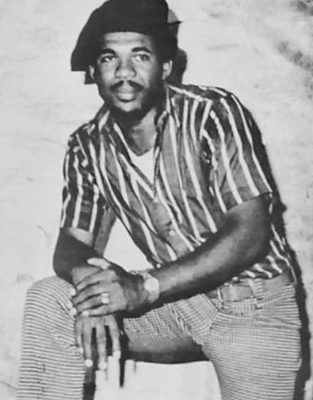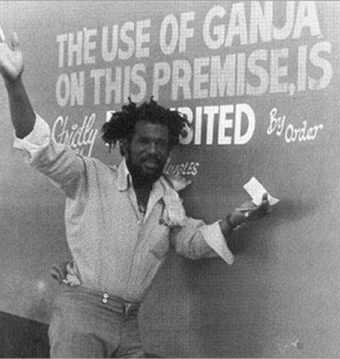GLEN BROWN

Reggae's 'Rhythm Master'
by Eric Doumerc
(December 2019)
Glen Brown was born in Kingston, Jamaica, in 1944 and entered the music business in the mid-1960's when he formed a duo with the singer Lloyd Robinson. They recorded several tracks for producer/sound-system legend Duke Reid like "Little Girl," a version of the Sam Cooke song. They also provided harmonies on some Derrick Harriott songs, like "The Loser."
Glen Brown then joined the Cecil Lloyd Quintet, which was at the time one of the best jazz combos on the Jamaican hotel circuit and developed a passion for jazz, which was to have a great influence on his career as a producer. He then worked with the Sonny Bradshaw Seven, which had a residence at the Sheraton at the time. Brown also recorded a few sides with Hopeton Lewis ("Girl You Cold") and Dave Barker around 1968-69.
At the time, Brown began a partnership with a local businessman named M.G.Mahtani, who owned a jewellry store on King Street called Shalimar. Mahtani also had a small record label called Shalimar and had released several 45's on it by artists like Stranger Cole and Gladstone Anderson. After releasing several 45's on Shalimar, Brown finally opened his own record shop in the Cross Roads area, on Caledonia Place, which helped him considerably when he moved into record production in the early 1970s.
Glen Brown's first hit as a producer was an instrumental entitled "Merry Up" (1971), a simple melody played on the melodica by Joe White. By the early 1970's, that instrument had already been made popular by Augustus Pablo who had had a big hit with "Java" in 1971. "Merry Up" was a runaway hit and remained in the Jamaican charts for several weeks in 1972, even knocking from the Number One spot Ernie Smith's "Pitta Patta."
Brown started several labels over the course of his long career (Pantomine, Dwyer, South East Music), but Pantomine [sic] is probably the one that is most associated with this producer. One of the most influential releases on that label was the song entitled "Realize" (1972) by Richard Mac Donald, which was based on an earlier instrumental track by Tommy McCook and Richard Hall. known as "Dirty Harry" (the deejay Prince Jazzbo later recorded a track entitled "Mr Harry Skank" named after that riddim). The horn-man Richard Hall also became known as "Dirty Harry" on account of the popularity of this riddim, which is probably an allusion to the Don Siegel film of the same name. Hall was to become something of a reggae legend and later starred in the 1978 movie Rockers, alongside Leroy "Horsemouth" Wallace.
Brown always seemed to be able to get the best out of the deejays he worked with, and Prince Jazzbo's "Mr Harry Skank" (the B-side of "Realize") is a case in point. Indeed, this track is a reggae version of a traditional Jamaican ring song originally known as "Go Down Manuel Road" or "Go Down Galloway Road" and which was mentioned by Water Jekyll in his Jamaica Song and Story (1907).
The "Dirty Harry riddim" was to prove very popular and in 1979, Sly Dunbar versioned it on a Virgin single with "Rasta Fiesta" on the flip side. Even Yellowman recycled that riddim for his "Lost Mi Love," recorded in 1982 for the producer Henry "Junjo" Lawes.
Glen Brown's love of jazz appeared in "Never Too Young to Learn," a track recorded by Roman Stewart and backed by the seminal Jamaican outfit Now Generation. This tune gave rise to a jazzy toast by Big Youth entitled "Opportunity Rock."
1972 saw the release of "Boat to Progress" by Richard McDonald, which was followed by two versions, one by I-Roy ("Festive Season") and the other by Prince Jazzbo ("Mr Want It All").
In spite of all these astounding tracks, Brown's reputation as a producer was to rest on a series of instrumentals and dub tracks like 1972's "Dirty Harry," "Tubby's At the Controls" (also from '72 and a dub cut of "Merry Up"), "No More Slavery" (from 1975, a melodica version of the great tune "Slaving" by Lloyd Parkes), "School Call" (1973) or "Pantomine Rock" (1973). These dub tracks were all characterized by tortuous basslines, majestic horns, scintillating percussion and highly complex rythmic patterns. They often featured the melodica as the lead instrument and Brown can thus be credited with being one of the producers who popularised that instrument in Jamaica and elsewhere. Brown was also one of the first producers to use King Tubby's mixing talents and to credit him on his 45s (for instance on 1972's "King Tubby's At the Controls").
The latter part of Glen Brown's career tied in with the roots era in Jamaican music, that is the mid to late 1970's. During that period, Brown worked with several little-known singers and deejays and continued to follow his highly idiosyncratic approach. One of the artists he worked with was Sylford Walker, a roots singer whose vocal style is reminicent of Burning Spear or Joseph Hill, as can be heard on tracks like "Deuteromy" (1979), "Chant Down Babylon" (1978) or "Lamb's Bread" (1978).
Brown also recorded the little-known deejay Welton Irie, and even released a whole album of material by that deejay (Ghettoman Corner, 1982) on his Pantomine label. Irie's highly individual style fitted in well with Brown's approach, as can be heard on the track entitled "Black Man Get Up Stand Up Pon Foot," a version of the song entitled "Deuteronomy" by Sylford Walker. Sylford Walker's album Lamb's Bread International, which was released on the Blood and Fire label in 2000, featuring a dozen tracks by Welton Irie.
Another obscure artist Brown worked with was Wayne Jarrett, a Horace Andy soundalike who recorded a song entitled "Youthman" in 1979. Thta riddim associated with that track was to become a sound system favourite in England in the late 1970's on account of its tremendously heavy bassline which also bedded "Wicked Can't Run Away" by Glenroy Richards.
Lastly, it is important to remember that Glen Brown was also a gifted singer who recorded reggae versions of soul standards in the early 1970's (like a version of the Manhattans' "I'm Not a Run-Around" in 1973 or his version Aaron Neville's "Tell It Like It is" in 1974), but also did potent roots anthems like "Marcus Garvey Words" (1979) and "Away With the Bad," Forward the Good" (1979).
A new interest in Glen Brown's music was fostered by the release of the 1989 Greensleeves compilation album Check The Winner (The Original Pantomine Instrumental Collection 1970-74), followed by Glen Brown – Boat to Progress (The Original Pantomine Vocal Collection 1970-74), with notes by Chris Lane.
In 1996, Steve Barrow's Blood and Fire label released the Glen Brown and King Tubby album Termination Dub (1973-1979). The same label also released the Sylford Walker album mentioned above, which enabled the underrated singer to buy a house. About ten years ago, Glen Brown, who had been living in the USA since the 1980's, had to check into a nursing home in New York as he was suffering from diabetes, dementia and kidney failure. On 4 October 2019, the "Rhythm Master" passed away in that nursing home.
Glen Brown should be remembered as a highly idiosyncratic voice in Jamaican music and as a great innovator. He was a maverick in every sense of the word and his jazz-influenced approach and skills as a producer will make sure that a new generation of fans will learn about his groundbreaking work.
References:
Barrow, Steve and Peter Dalton. The Rough Guide to Reggae. London: Rough Guides, 1997.
Katz, David. Solid Foundation – An Oral History of Reggae. London: Bloomsbury Publishing, 2003.
Lyew, Stephanie. "'Rhythm Master' Glen Brown Has Died," The Gleaner, 5 October 2019.
